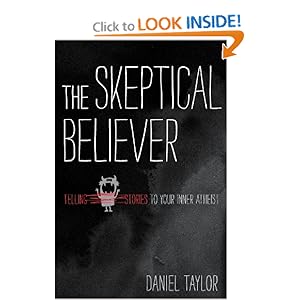
I am grateful to Scot McKnight for bringing my attention to Daniel Taylor’s wonderful book, The Skeptical Believer.
The title is terrific, but I like the subtitle even better: Telling Stories to Your Inner Atheist.
http://www.amazon.com/The-Skeptical-Believer-Telling-Stories/dp/0970651155/ref=tmm_pap_title_0

There are far too many things I like about Dan’s book to do one post, so I am going to do several in the weeks ahead. Those who know me best understand why I would find so much resonance with The Skeptical Believer. You could say I am a “serial doubter.”
Before we embark on Dan’s terrific book, let me say something about its design. Dan’s son, Matthew, designed the book. It is exquisitely and creatively put together. Even though it is beautifully done and almost 400 pages in length, the cost is only $14.95!
Here then are a few things from the first section of Dan’s book (or about 70 pages):
*The quotes Dan provides at the beginning of each chapter are wisely selected. The book starts off with this gem by Miguel de Unamuno:
“Those who believe that they believe in God, but without any passion in their heart, without anguish of mind, without uncertainty, without doubt, without an element of despair even in their consolation, believe only in the idea of God, not in God Himself.”
*Many Christians feel the compulsion to act like the life of faith is easy and struggle minimal. Dan provides loads of wisdom and breathing room to be more honest with our nagging questions and doubts. And Dan offers humor throughout his book!
*In his inimitable way, Dan does a great job of describing how the old faith v. reason conundrum is bogus. Others have demonstrated this as well, but Dan the literature professor and gifted writer offers us a fresh perspective.
*The Skeptical Believer has one of the best explanations of the power of “story” that I have ever read.
*Daniel Taylor isn’t interested in simply offering witty and well-written words about skepticism. He wants to help us. His section (I won’t tell you the page numbers because I want you to buy the book) on dealing with what he likes to call “clutter” rather than busyness is one of my favorite parts in the first section.








